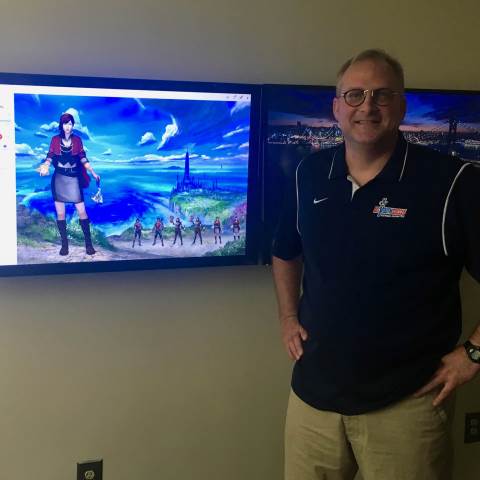

Gamification is the process of using game design to reshape the learning environment. One can use either the class management methodology, assessment strategy, or knowledge/skill acquisition phase or some mix of them all.
One of the keys to the entire gamifying concept and methodology is this: THE IDEA IS NOT TO REPLACE THE TEACHER. It is to replace the typical “lecture”, “book” and “homework” model…in fact, the teacher becomes, in a sense, more critical. Rather than just a faucet through which the information must flow, the teacher becomes a necessary resource and partner to accomplish the goals/”quests” set out by the adventure, whatever form that takes.
Recently, I presented at the weekly Coffee EDU. This professional development opportunity takes place on Tuesday mornings, throughout the summer from 9:30-11:00, for Darlington faculty. I shared the gamification process I used in my PreCalculus and Algebra 2 Honors classes throughout the 2016-17 school year. I had the opportunity to review some of the successes and failures using various forms of Gamification in these courses. I won’t belabor those models here, but I will say this:
The level of student engagement was improved tremendously through the use of gamification in my math classes.
During the first semester, a homework assignment would be about 15 problems. We would complete some of the problems in class and then they would usually have about 15 to finish over the next two days until we met again.
In January, I decided to begin the gamifiation process. I developed the game in three levels. Students would work on problems, generated from our online mathematics curriculum, and they would work to receive super powers and move up to Level 2 or "Boss Level." Superpowers included: ask a teacher, swap a problem, ask a teammate, and eliminate a problem. Receiving these superpowers and the ability to progress through levels were motivating incentives for the students. The competitive nature of the game encouraged them to keep working, even when they failed, and they were learning how to complete the problems on their own! I did not have to teach all of the material in a lecture format.
When I used the gamification process in the PreCalculus class, students would complete problems until they mastered them. So, the more talented mathematicians would only need 10-12 problems to succeed. Others would complete 50, 100, or 150. They didn’t realize they were doing so many problems. They were simply trying to “level up” in the game so they could receive a “super power” and move on to the next stage of the game.
In Pre-Calc, I didn’t attach any “story” to the process but rather a structure of assessment and a “reward schedule.”
A member of Darlington's Board of Trustees visited an Algebra 2 Honors class in May. The class he observed was using Class Craft. This is an online program allowing teachers to gamify their classrooms. Recently, I made the decision to sponsor a gamification I Period. The students in this group worked together to gamify my Algebra 2 Honors classes using Class Craft as a guide. The board member had the opportunity to observe the game in action! He witnessed 18 students engaged in their learning, having fun, and working collaboratively with one another and their teacher.
The expectations for this game are high. Students create their own avatars and are Healers, Warriors, or Mages. Teams create their own names (Fighting Pickles, Volcano Cobras, Diverse-City) and work together to create experience points and leveling up to get new powers to use during class.
One day, we had a player level up twice during class. Each time students move up a level, a special sound plays over the speakers. Everyone in the room started asking the student how he leveled up, and he said, "Well, I turned my report in early and got extra experience points, and I started helping others with their work too and I guess I got extra XP for that as well."
To learn more about gamification, click on the links below:
Video: Jane McGonigal
Video: Gabe Zichermann
Video: Paul Anderson
Changing the Game in Education